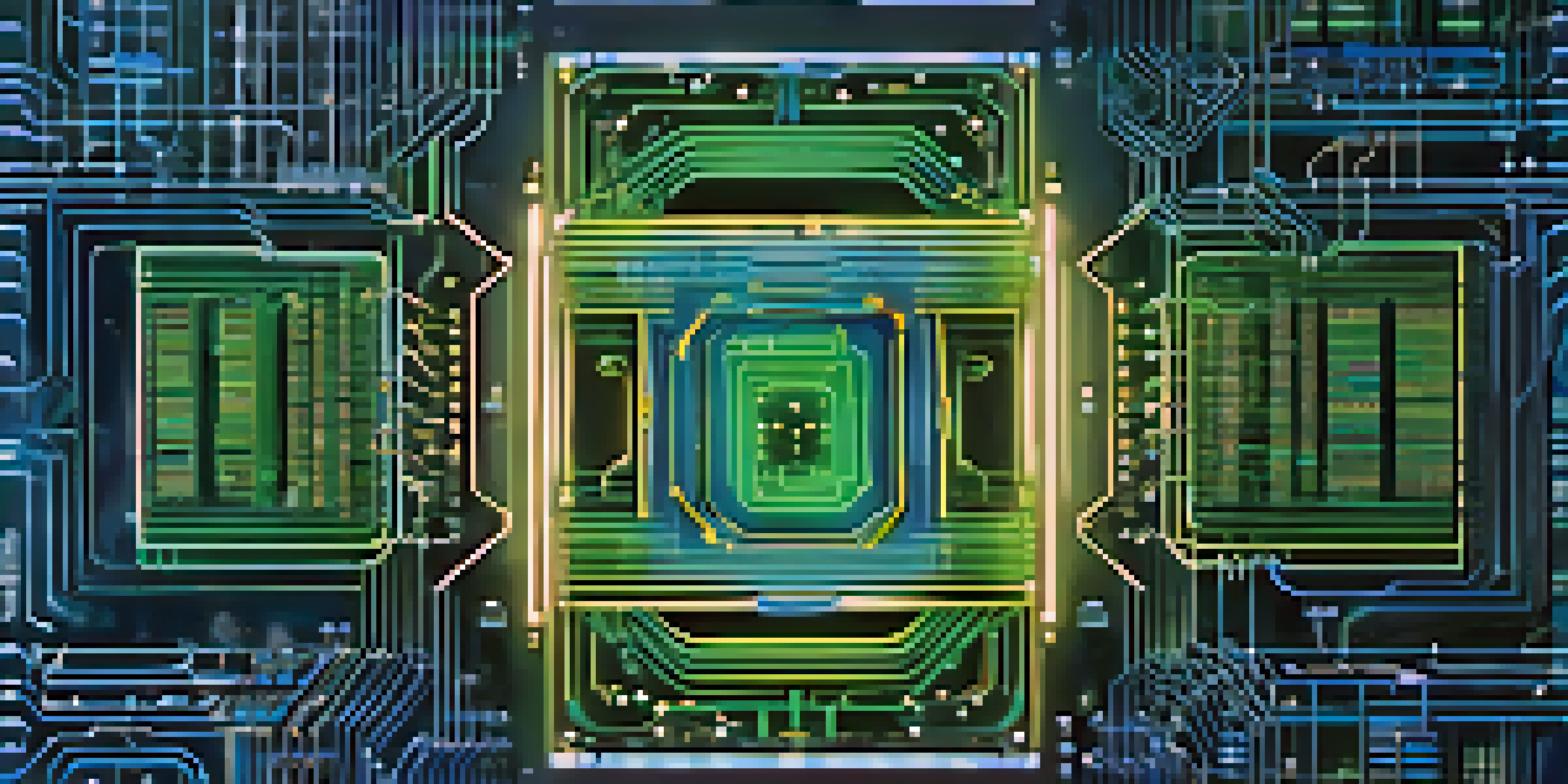Understanding Quantum Computing: Basics and Principles Explained

What is Quantum Computing? An Introduction
Quantum computing is a revolutionary technology that harnesses the principles of quantum mechanics to process information. Unlike traditional computers, which use bits as the smallest unit of data, quantum computers use quantum bits, or qubits. This allows them to perform complex calculations at speeds unimaginable for classical computers.
Quantum computing is the next technological revolution that will change the way we think about computation.
To put it simply, while a traditional bit can be either a 0 or a 1, a qubit can be both at the same time, thanks to a phenomenon known as superposition. This unique feature enables quantum computers to explore multiple solutions simultaneously, making them incredibly powerful for specific types of problems.
As we delve deeper into the world of quantum computing, it’s essential to understand not just what it is, but also how it can shape the future of technology, from cryptography to drug discovery, and beyond.
Key Principles of Quantum Mechanics
To grasp quantum computing, we need to explore a few key principles of quantum mechanics. The first is superposition, which allows qubits to exist in multiple states at once. Imagine spinning a coin; while it's in the air, it can be both heads and tails until it lands.

Another crucial principle is entanglement, where qubits become interconnected in such a way that the state of one qubit directly affects the state of another, no matter the distance between them. This can be likened to a pair of magic dice that always land on the same number, no matter how far apart they are thrown.
Lastly, there's quantum interference, which helps quantum computers to amplify the probabilities of correct answers while canceling out incorrect ones. Together, these principles create a foundation for the capabilities of quantum computing.
How Quantum Computers Work
At the heart of quantum computers lies the quantum circuit, a series of quantum gates that manipulate qubits to perform calculations. These gates are the quantum equivalent of classical logic gates but can handle much more complex operations due to their ability to manage superposition and entanglement.
The future is not about classical computing, it is about quantum computing and the new possibilities it creates.
When a quantum algorithm is executed, it involves a series of transformations applied to qubits, allowing them to interact in ways that classical bits cannot. This can lead to outcomes that can be exponentially faster for specific calculations, such as factoring large numbers or optimizing complex systems.
Ultimately, the processes and operations of quantum computing reveal a new paradigm in information technology, one that challenges our traditional understanding of computation.
Quantum Computing vs. Classical Computing
While both quantum and classical computers process information, they do so in fundamentally different ways. Classical computers rely on a straightforward binary system of bits, while quantum computers leverage the complex properties of qubits. This difference allows quantum computers to solve certain problems much more efficiently.
For example, in tasks like optimization or simulating molecules for drug discovery, quantum computers can evaluate multiple outcomes at once. In contrast, classical computers would take a more linear approach, solving one possibility at a time, which could take significantly longer.
Understanding these distinctions highlights the potential of quantum computing to revolutionize industries that rely heavily on computational power, illustrating its unique advantages over classical systems.
Real-World Applications of Quantum Computing
Quantum computing is not just a theoretical concept; it has practical applications across various fields. In finance, for instance, quantum algorithms can analyze market patterns and optimize portfolios much faster than traditional methods. This could lead to more efficient trading strategies and risk management.
In healthcare, quantum computing holds the promise of accelerating drug discovery by simulating molecular interactions at a level of detail that classical computers cannot achieve. This could lead to breakthroughs in treatments and therapies for complex diseases.
Additionally, quantum computing is making waves in cryptography, where it could potentially crack encryption methods that currently safeguard sensitive data. This duality illustrates both the promise and the challenges posed by this emerging technology.
Challenges Facing Quantum Computing
Despite its promise, quantum computing faces significant challenges that must be overcome for it to reach its full potential. One major hurdle is qubit stability; qubits are notoriously fragile and can easily lose their quantum states due to environmental interference, a phenomenon known as decoherence.
Moreover, building and maintaining a quantum computer is an expensive and complex endeavor. Researchers are continually exploring ways to create more stable qubits and improve error correction methods to enhance the reliability of quantum computations.
Addressing these challenges is crucial for the advancement of quantum computing, as overcoming them will determine how quickly and effectively this technology can be integrated into real-world applications.
The Future of Quantum Computing
The future of quantum computing is bright, with ongoing research and development promising advancements that could propel this technology into the mainstream. As we continue to solve the challenges surrounding qubit stability and error correction, we can expect more reliable quantum systems to emerge.
Tech giants and startups alike are investing heavily in quantum research, indicating a growing recognition of its potential. This investment may lead to innovations that could reshape industries, from pharmaceuticals to artificial intelligence.

Ultimately, as quantum computing evolves, it will not only enhance computational capabilities but also redefine what is possible in technology, paving the way for new discoveries and solutions to complex problems.